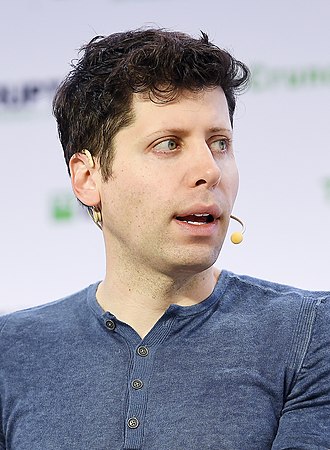Sam Altman is a prominent figure in the tech world, known for his work as an entrepreneur, investor, and, most notably, as the CEO of OpenAI, the artificial intelligence research organization that has become a leader in advancing the capabilities of AI. Altman’s influence extends beyond just artificial intelligence, however; he has made significant contributions to the startup ecosystem through his role as the president of Y Combinator, one of the world’s most successful startup accelerators. Like other high-profile tech figures, Altman’s vision is focused on the future, with ambitions to solve some of the world’s most challenging problems.
Early Life and Education
Samuel H. Altman was born on April 22, 1985, in St. Louis, Missouri. From a young age, he showed an aptitude for technology, learning to program computers when he was only 8 years old. Altman attended Stanford University, where he studied computer science, but like many Silicon Valley entrepreneurs, he dropped out to pursue his own ventures.
Altman’s early exposure to technology, along with his experience growing up in the Midwest, shaped his pragmatic yet forward-thinking approach to problem-solving. His childhood passion for coding and technology would eventually lead him to some of the most innovative corners of the tech world.
Loopt: The First Entrepreneurial Foray
Altman’s first major entrepreneurial venture was Loopt, a location-based social networking app that he co-founded in 2005 when he was just 19 years old. Loopt was designed to allow users to share their location with friends in real time, a concept that was ahead of its time but eventually became mainstream with apps like Foursquare and Google Maps.
Despite raising $30 million in venture capital, Loopt struggled to gain widespread adoption. In 2012, the company was sold to Green Dot Corporation for $43 million. While Loopt wasn’t a massive commercial success, the experience gave Altman a foothold in Silicon Valley and opened doors to bigger opportunities in the tech ecosystem.
Y Combinator: Fostering Innovation
In 2014, Altman became the president of Y Combinator (YC), a startup accelerator that provides funding, mentorship, and resources to early-stage companies. Under his leadership, YC expanded significantly, becoming one of the most influential institutions in Silicon Valley. YC has been instrumental in the growth of several billion-dollar startups, including Airbnb, Dropbox, Reddit, and Stripe, among others.
Altman’s tenure at Y Combinator marked a period of tremendous growth for the organization. He was known for his ability to identify talented founders and his emphasis on scalable, high-impact technology startups. During his time at YC, Altman also introduced initiatives like YC Continuity, which provides follow-on funding for later-stage startups, and YC Research, a nonprofit arm focused on long-term projects like artificial intelligence and basic income.
His leadership helped cement Y Combinator’s reputation as one of the top startup accelerators in the world, with its companies collectively valued at over $300 billion.
OpenAI: Shaping the Future of Artificial Intelligence
In 2015, Sam Altman co-founded OpenAI alongside Elon Musk and other notable tech figures with the mission to ensure that artificial intelligence (AI) benefits all of humanity. OpenAI was initially established as a non-profit research organization, with the goal of developing artificial general intelligence (AGI) that is safe and aligned with human values. Altman became the CEO of OpenAI in 2019, and under his leadership, the organization has developed groundbreaking AI technologies, including the GPT series of language models.
GPT-3 and GPT-4, the latter of which powers this very conversation, are some of the most advanced AI models in existence, capable of generating human-like text, answering complex questions, and even creating software. These advancements have garnered significant attention and spurred widespread discussions about the ethical and societal implications of AI.
Altman’s leadership at OpenAI has also focused on ensuring that powerful AI systems are developed in a way that minimizes risks, such as potential misuse or the concentration of power in too few hands. In 2019, OpenAI transitioned from a non-profit to a “capped-profit” model, allowing it to attract the massive funding required to compete with tech giants while staying committed to its core mission of aligning AI with humanity’s best interests.
Altman’s Broader Vision and Investments
Beyond OpenAI and Y Combinator, Sam Altman has a keen interest in other transformative technologies. He has invested in a wide range of companies, including Airbnb, Stripe, and Reddit, as well as more speculative ventures in fields like energy and biotechnology. One of his notable investments is in Helion Energy, a company focused on developing nuclear fusion technology—a potential game-changer for clean, unlimited energy.
Altman has publicly stated that he is particularly interested in problems that are both large in scale and difficult to solve, such as improving the quality of life for billions of people. His work on universal basic income (UBI), an idea that proposes providing a guaranteed income to all citizens, reflects his forward-thinking approach to addressing the societal challenges posed by technological progress, particularly automation and AI.
Leadership Style and Public Persona
Altman is known for his analytical and philosophical approach to leadership. He has a reputation for being thoughtful, methodical, and focused on long-term outcomes rather than short-term gains. Unlike some other tech leaders, Altman tends to stay out of the spotlight, preferring to let his work speak for itself.
Despite his relatively low-key public persona, Altman is active on social media and frequently shares his thoughts on a wide range of topics, including AI, economics, and the future of humanity. He is known for his optimism about technology’s ability to solve major global problems, but he also acknowledges the risks, particularly in fields like artificial intelligence.
The Future: Altman’s Legacy in the Making
Sam Altman’s career is defined by his desire to tackle the biggest challenges of our time, from space exploration and AI to energy sustainability and economic inequality. His work at OpenAI, in particular, has positioned him as a central figure in the debate about the future of artificial intelligence and its potential to reshape society.
As AI continues to develop at a rapid pace, Altman’s role in guiding its ethical and responsible use will be critical. His ambition to ensure that AI benefits all of humanity, not just a privileged few, is at the core of his vision for the future.
Conclusion
Sam Altman is a visionary leader who has left an indelible mark on the tech industry, from fostering innovation through Y Combinator to spearheading advancements in artificial intelligence with OpenAI. His journey is far from over, and his influence is likely to grow as the technologies he champions—such as AI, clean energy, and universal basic income—become increasingly central to global conversations about the future.
Whether as an entrepreneur, investor, or thought leader, Altman’s work reflects a commitment to using technology to solve humanity’s most pressing challenges. He stands at the forefront of efforts to ensure that future technologies are not only powerful but also equitable and beneficial to society at large.
4o

